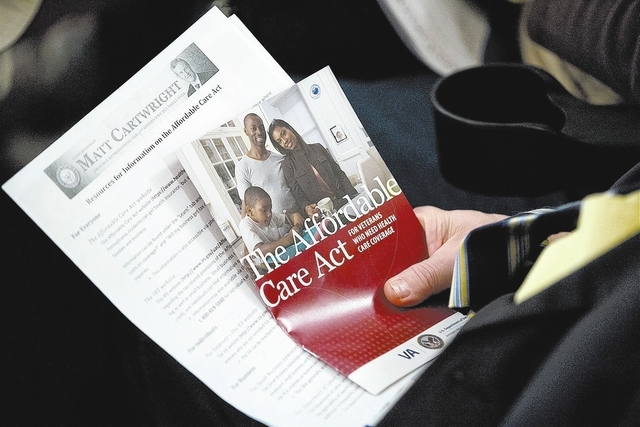Las Vegans find inventive ways to get around Obamacare – the law of the land
The Affordable Care Act may be the law of the land, but that’s not stopping Las Vegans from trying to get around it.
From renewing insurance before it expires to breaking up businesses and even families, locals are weighing some unusual options to escape provisions of the law, also called Obamacare.
What we present here is by no means a comprehensive list of Obamacare loopholes Nevadans might exploit. With 2,000 pages of legislation and thousands of pages more in regulations, and confusion even among attorneys and human resources experts on what exactly all of those rules say, consumers have plenty of opportunities to get creative. But the ideas described below are the tactics local insurance brokers and attorneys say clients ask about most often these days.
If you don’t see your grand scheme here, don’t fret: Perhaps its time hasn’t come yet. Businesses and consumers will probably have moved onto a whole new crop of avoidance tactics in a month or two. Because if there’s one thing that’s for sure, experts say, it’s that people will probably never stop looking to dodge Obamacare.
“Where there’s a will, there’s a way,” said Frank Nolimal, an employee benefits adviser at Assurance Ltd. in Las Vegas.
The tactic: Early renewal
Who’s doing it: Individuals and small businesses
How does it work? The Affordable Care Act requires coverage come with dozens of new essential health benefits. Brokers say the benefits, which include everything from preventive screenings to substance-abuse counseling to bariatric surgery, are driving up premiums.
The catch is, those benefits don’t have to be in your plan until after Jan. 1. So legions of businesses and consumers with policies set to expire in the first quarter renewed coverage in advance — mostly from Oct. 1 to Dec. 1 — to lock in essential-benefit-free plans and keep their lower premiums for most of 2014.
Brokers and attorneys agree early renewal is one of today’s most popular avoidance tactics. Individuals, employers and even insurance carriers themselves all embraced early renewal. In fact, one of Nevada’s biggest insurers offered it to virtually every member with a policy set to expire in January, February or March, Nolimal said. It’s an offer he said he’s never seen any insurer make before.
“Carriers want to make sure they capture renewals,” he said.
The premium difference is stark: For plans that start Dec. 1, premium increases will be 10 percent to 12 percent, Nolimal said. For plans that begin Jan. 1, premiums are spiking anywhere from 40 percent to 60 percent. That’s why 87 of Nolimal’s 96 small-group clients re-upped coverage before they had to.
“Early renewal lets us figure out what the best practices are as we go through 2014,” said Larry Harrison, a local spokesman for the National Association of Health Insurance Underwriters and an independent broker with benefits consultant National Healthcare Access. “For people who are going to be renewing in February, it’s, ‘Oh, my gosh’ — just sticker shock. I can tell you, the rates are horrendous.”
Drawbacks: You’re just delaying the inevitable, and it’s probably too late if you haven’t started renewal by now.
Benefits: Because your coverage took effect before the Jan. 1 deadline, it doesn’t have to have the essential health benefits that could make your premiums pricier in 2014.
The tactic: Join a PEO
Who’s doing it: Businesses with fewer than 50 workers
How does it work? Right now, you’re saying, “PE-what?”
Professional employer organizations are one of the best-kept secrets in human resources, Nolimal said.
Small companies join professional employer organizations to outsource pretty much all of their human-resources tasks. The groups go way beyond mere payroll services or insurance purchasing. They handle all of a client company’s government compliance, tax administration, hiring, training and corporate policies.
Once you sign up with one, you’re considered part of a larger group, along with all of the group’s other clients. So your small business, with its 10 employees, could enjoy the insurance-buying clout of hundreds or thousands of people. That’s important because large groups have a pricing advantage under the new rules.
Here’s why: For individual and small-group insurance, Obamacare prohibits charging buyers based on health. So the 55-year-old man who had a bypass in 2012 will pay the same as a 55-year-old man who’s running marathons. The law also limits how much higher premiums can be based on age. Insurers used to be able to charge older people seven times the premium they collect from 20-somethings. That new gap can be only three times more.
But the way the law is written, large groups are exempt from those rules. So professional employer organizations can make prospective clients fill out a medical questionnaire on their staffers’ health, and cherry-pick only businesses with young, healthy workforces. When it’s time for them to shop for coverage, they can still get lower premiums as a result.
Drawbacks: This tack could hurt the whole system, Nolimal said. He said he sees potentially big problems with adverse selection, or the shifting of healthy workforces away from exchange plans. Without young, healthy people in the exchange to defray the costs of the older and sicker, premiums could rise more dramatically than expected. Once the U.S. Department of Health and Human Services sees that start to happen, officials are likely to close the loophole. “I think there’s a short window of opportunity for PEOs,” Nolimal said.
Benefits: You get rewarded financially for keeping your staff healthy.
The tactic: Buy a skinny plan
Who’s doing it: Companies with more than 50 employees
How does it work? So Obamacare is all about enriching coverage so you get more stuff in your plan, right?
Not always.
Sheldon Blumling, a partner in labor law firm Fisher &Phillips, said “a fair number” of employers are offering skinny plans, which significantly cut back on coverage. They may offer some basic preventive care, but little else beyond that. Some skinny policies don’t even pay for hospital stays or surgery.
Because a skinny plan is at least some kind of coverage, it gets companies out of the $2,000-per-person fine for not offering insurance after Jan. 1, 2015. The penalty applies to companies with more than 50 full-time-equivalent workers.
Yes, there’s an even worse $3,000 fine for providing subpar coverage, but employers get dinged only if their workers get insured through the exchange, rather than the company, Blumling said. That’s not likely, because exchange premiums are higher than skinny-plan costs.
“A lot of employers are banking on the idea that not a lot of employees will buy on the exchange,” he said. “If an employer can put in place a bare-bones plan that’s pretty cheap, a lot of employers will buy that instead.”
Drawbacks: It’s a bit of a gamble. If more employees than expected decide they need comprehensive coverage, your penalties could be higher than if you hadn’t offered a plan at all.
Benefits: If it goes according to plan, most people will sign up for company coverage, which is cheaper than either the $2,000-per-worker fine or a plan that would meet Obamacare standards.
The tactic: Break up the company
Who’s doing it: Small to midsized businesses
How does it work? It usually doesn’t.
The business breakup is related to another common tactic — trying to get a company under 50 full-time-equivalent workers so the law won’t apply. For businesses who can’t cut hours or people, their next choice is to dissolve their company into smaller parts. Blumling said he’s getting “a lot” of inquiries about the possibility.
And he usually tells them not to bother. That’s because of an obscure set of federal regulations called controlled-group rules, which say if one person owns multiple entities, those organizations are all treated as one for the purpose of counting full-time-equivalent employees.
The only way to make it work is to bring in other owners to take over more than half of your subsidiaries, Harrison said.
Drawbacks: You lose management control of your business.
Benefits: You could technically drop below the 50-worker threshold for Obamacare coverage if you give up at least half of your ownership in your related companies.
The tactic: Divorce
Who’s doing it: Individuals
How does it work? By splitting up, a couple could qualify separately for low-cost coverage alternatives.
Nolimal said several clients have asked him about the possibility. Typically, they have a low-earning spouse, and on-the-job coverage through an employer who pays 100 percent of their premium, but none of the premium for their spouse and kids. They haven’t carried coverage on family members because the cost would be prohibitive, but now, with the individual mandate kicking in, they could be on the hook for up to 1 percent of their income for not insuring the rest of the household.
So they ask Nolimal if divorcing would make a difference. And it could, he said: If a spouse earns below the poverty level, or doesn’t work at all, then he or she might qualify for Medicaid as a single.
“If a spouse earns below about $35,000, she could get free health care,” Nolimal said.
It’s not a preferred approach, but it is one born of desperation. Said Nolimal: “Necessity is the mother of invention. How do I get my family covered?”
Drawbacks: You’re single. :(
Benefits: Heeeyyy — you’re single! :D
What’s coming down the pike: New ideas are gestating, both on the insurer side and among individuals, experts said.
Unlike some states, Nevada has no laws barring employers from offering singles’ coverage to married people with kids. So look for carriers to begin offering single-only plans through employers, Nolimal said. That will allow spouses and kids to go to the exchange and get federal tax credits because insurance technically wasn’t provided through the breadwinner’s workplace.
Some people are even looking at tweaking their income-tax withholding status for 2014 to eliminate any refund in 2015, Nolimal said.
That’s because the Internal Revenue Service will deduct fines for not carrying coverage from tax refunds. If you’re not getting a refund, the IRS can’t really collect, because Obamacare doesn’t allow the agency to file liens or use any other hardball collection methods.
You should know, though, that the IRS can carry forward penalties for a decade, so if you do get a refund someday, you’ll have to make good on your health insurance penalty.
Contact reporter Jennifer Robison at jrobison@reviewjournal.com. Follow @J_Robison1 on Twitter.

















